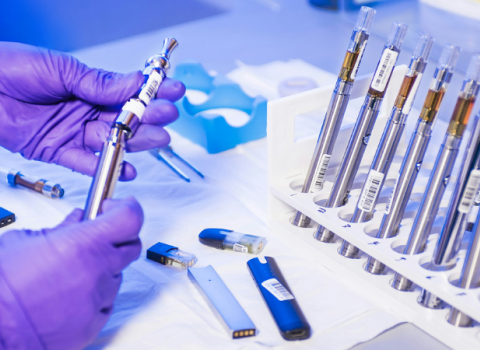
It was a relief then when Biovitrum announced recently it was to extend the collaboration with its US counterpart Amgen, despite the lead compound failing in Phase II trials.
Sector at a glance
Companies: ~200
Employees: 6000
Main clusters: Stockholm/Uppsala; Gothenburg; Malmö/Lund
Representative companies: Active Biotech, Affibody, BioInvent, Biolipox, Biovitrum, Carlsson Research, Cellartis, Karo Bio, Medivir, NeuroNova
Cash-rich Biovitrum, spun out from Pharmacia (now part of Pfizer) in 2001, is the country's flagship biotech company, and the original three-year deal with Amgen to find inhibitors of 11-beta-hydroxysteroid dehydrogenase 1 (11BetaHSD1) was one of the biotech industry's biggest of 2003, putting Sweden's biotechnology sector firmly on the international map.
But the development programme hit an early roadblock, when the lead compound, BVT.3498, failed in Phase II clinical trials. Amgen's withdrawal from the alliance would have shaken confidence in the entire sector.
"Biovitrum has to succeed. We pray for that, because that's a favour to us all," says Jonas Frick, CEO of Stockholm-based Scandinavian Life Science Venture (SLSV), one of the largest life sciences investors in the region, with €270 million under management.
Stockholm-based Biovitrum's importance to the wider sector points to a lack of progress on the part of other, longer established firms. Companies such as Karo Bio, a leader in nuclear receptor biology, and Medivir, an expert in protease and polymerase inhibition, have struggled to convert ambitious and novel science into solid product franchises.
As a result, the Swedish biotechnology sector has yet to register its first drug approval, and it has few products in late stage clinical development. Nevertheless, Frick, who was CEO at Huddinge-based Medivir before to joining SLSV in 2003, says that the sector is steadily maturing. "We have put our act together," he says. "I have three, four companies in my portfolio which are close to cash neutral – which was never heard of two or three years ago.”
Queueing up in the pipeline
The biotech sector currently has a pipeline of 46 molecules in the clinic, plus another 41 drug candidates that are no more than 12 months from entering clinical trials, according to a recent analysis conducted by SwedenBio.
This pipeline, says Ylva Williams, head of life sciences at Invest in Sweden Agency (ISA), which is responsible for inward investment, is a central component in its strategy to attract overseas investment through partnerships between Swedish and international biotechnology companies. It has yet to persuade overseas biotechnology firms to establish R&D functions in Sweden, but that too is on the agenda. "I think it's more natural to have that as a second step after working closely with a company for a while," Williams says.
However, there are several examples of industry-university research collaborations, among them Sumitomo Pharmaceuticals' long-standing alliance in Alzheimer's disease with the Karolinksa Institute in Huddinge, south of Stockholm.
Sweden has not developed a specific set of incentives to lure overseas firms, although Williams points to several factors that are favourable to foreign investors. "Corporation tax is one of the lowest in Europe, if you exclude Ireland," she says. Companies pay 18 to 20 per cent of their profits in tax, while salary costs are lower than in Germany and Denmark.
In addition, the legislative climate in Sweden is favourable towards biotechnology, particularly stem cell research, an area in which the country is a genuine contender for world leadership.
Tax, lots of it
But the high personal tax regime militates against recruiting overseas executive talent. And a partial tax exemption for overseas 'experts' has not been successful so far. The procedure for obtaining the tax break is not transparent and applicants do not know in advance whether they will be eligible.
A survey published last September by SwedenBio, the country's industry association, indicates that the investment climate has improved in the past two years, although early stage ventures still face a funding gap.
SwedenBio is now lobbying its government on this issue – and on the creation of incentives for R&D. Along with its counterparts in Norway, Estonia and Finland, it is involved in an initiative – part-study, part-lobbying campaign – that is examining the support that other countries, including France, the UK and Canada, provide to biotechnology companies. The four industry groups hope to convince their respective governments of the need to put in place similar measures.
"It's mainly because we have such a strong tradition in pharmaceutical research that the government hasn't been so aggressive," says Markus Wistrand at SwedenBio.
The government is introducing modest support for R&D performing small and medium-sized combanies across all sectors this year, but the contribution of small-scale R&D performers in Sweden to the country's total R&D effort is still relatively minor. "Sweden's R&D spending in the business sector is very heavily biased towards a small number of large companies," says Wistrand.
In 2003, just 20 companies were responsible for 68 per cent of business expenditure on R&, he says. The challenge for Sweden's biotechnology industry – and its other high-tech sectors – is to reduce that figure steadily and ensure that Sweden's industrial R&D effort is more broadly based.





 A unique international forum for public research organisations and companies to connect their external engagement with strategic interests around their R&D system.
A unique international forum for public research organisations and companies to connect their external engagement with strategic interests around their R&D system.